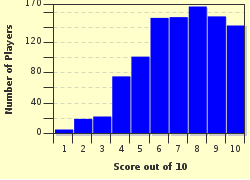Quiz Answer Key and Fun Facts
1. What two religious groups fought against each other in Ireland?
2. Throughout the 20th century, the area of Kosovo was a part of Yugoslavia and its successor state, Serbia, but the majority of Kosovars are not Serbs. Which ethnic group does the majority of the population call themselves?
3. What two ethnic groups were at the heart of the 1994 violence in Rwanda?
4. The Kurds are a people without an independent homeland and with a population stretching over several countries. Which is NOT one of them?
5. What animal is associated with the terrorist organization working for Tamil nationalism?
6. Which country did East Timor vote for independence from in 1999?
7. Which country lost the Golan Heights to Israeli control in the Six-Day War?
8. What religion did the majority of people living in Kashmir practice when British India was partitioned (1947)?
9. Which of the following ethnic groups were NOT involved in the conflict in Bosnia-Herzegovina in the early 1990s?
10. What separatist movement is associated with the ETA?
Source: Author
albinerhawk
This quiz was reviewed by FunTrivia editor
bloomsby before going online.
Any errors found in FunTrivia content are routinely corrected through our feedback system.


